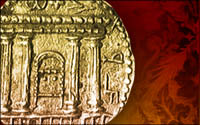 The Hasmonean Era was one of the most glorious and tragic in Jewish history – as well as for understanding Jewish history and destiny.
The Hasmonean Era was one of the most glorious and tragic in Jewish history – as well as for understanding Jewish history and destiny.
| Who/What | Time Frame | Highlights |
| Alexander the Great | Died 323BCE (according to most historians) | His father, Philip of Macedon, was the first one to unite the disparate, war-like Greek tribes (albeit at the point of a sword). He then brazenly attacked Persia, the world empire of his day, and defeated them. At his height, he died and passed on the torch to his son, Alexander. Philip gave Alexander the philosopher Aristotle as a teacher, who imbued him with Greek/Hellenist values that he spread to the world, which he proceeded to conquer. When he came to Jerusalem (329 BCE according to most historians), instead of sacking the city – the Jews had sided with the Persians – he dismounted his horse and bowed to the High Priest, Simon the Just, whose face he said resembled the angel that appeared in his dreams before each victory.Although he left the city in peace, and the Jews showed their gratitude by naming all children born that year Alexander, this was the beginning of Greek/Hellenist influence in Judea. At first the assimilation was innocent such as giving Jewish children Greek names and learning the Greek language. Eventually it led to Jews doing things like undergoing painful cosmetic surgery to reverse their circumcision, raising pigs and eating pork, bowing to idols and even siding with their enemies to destroy the Jewish nation and faith. Alexander died when he was only 29 years old. |
| The Seleucid Empire | 312 BCE–63 BCE | After Alexander the Great died his empire was divided between several Generals. The northern empire — which included Syria, Turkey (which was then Asia Minor) and Greece itself — was under the domination of a general called Seleucus, and therefore called the Seleucid Empire or the Seleucid Dynasty. It lasted about 250 years. |
| The Ptolemaic Empire | 305 BCE-30 BCE | The southern empire, which was basically Egypt and Africa, was under the domination of a general called Ptolemy. (There would be a subsequent 15 kings in the line who called themselves Ptolemy; it was a title like “King.”) The Jews in Israel tended to favor the Ptolemaic Empire. Its key city, Alexandria, hosted a large Jewish community with a replica (unauthorized) of the Temple in Jerusalem and an enormous synagogue that could hold 10,000 for prayer services. The Ptolemaic Empire lasted about 275 years. |
| Antigonus of Sokho | Leading scholar of generation c. 273 BCE-231 BCE | Simon the Just, the High Priest — whom Alexander the Great bowed to when he entered Jerusalem — died in the year 273 BCE. Antigonus succeeded him as inheritor of the Oral Tradition (Avos 1:3). Later disciples would misinterpret his words to start the sects known as the Sadducees and Boethusians (see below). |
| Septuagint | Before 246 BCE | Ptolemy Philadelphus (reigned from 285–246 BCE) commanded 72 Jewish sages to translate the Torah into Greek. This became known as the Septuagint. Although it opened up Jewish ideas to the non-Jewish world it also sped up the pace of assimilation among Jews (by giving the Greek language a stamp of approval) and became a source of mistranslations and distortions by later Christian and other scholars. |
| The Jewish Hellenists | Circa 200 BCE | Eventually, there arose among the Jewish population a group called the Misyavnim, meaning Hellenists: those who adopted Greek culture as a way of life. As time passed, more and more Jews not only spoke like Greeks, but took on their customs, attitudes and behaviors, which on so many levels were antithetical to the values of Judaism.Estimates are that a 30-40% of the Jewish population became Hellenists, including most of the upper class. Some were no doubt simply ignorant of Jewish life and tradition. Others, however, became vicious self-haters. These Hellenist Jews hated their brethren and openly sided with the enemies of Israel who attempted to destroy the Jewish nation and faith.
In the end, the influence of the Hellenists all but collapsed in the wake of the defeat of the Greeks and the miracle of Chanukah. Most of them retreated to the city of Caesarea, became completely Greek and were no longer part of the Jewish people. |
| Antiochus Epiphanes | Ruled the Seleucid Empire from 175 BCE until his death in 164 BCE | Around 190 BCE, the Seleucid Empire went to war with the Ptolemaic Empire and mounted an invasion that took their army through Judea. They exerted a very heavy hand against the Jews that grew progressively worse over the years.First, they wanted money. Then they wanted their soldiers to be housed. Then they mounted a statue of Zeus in the Temple and built a dominating fortress in the Temple.
As the war dragged out, they blamed the Jews as a scapegoat and outlawed the religion, making illegal (upon the punishment of death) such practices as circumcision and keeping the Sabbath. The Greeks would also come into towns and ravage Jewish brides. Many Jews fled to Alexandria. Those who remained in Judea were threatened with physical and spiritual annihilation. |
| Mattathias (Matisyahu) | Led revolt in 166 BCE | About 166 BCE, a group finally stood up to the Greeks: Matisyahu (Mattathias) and his sons (Johanan, Judah, Eleazar, Jonathan and Simon), whose family name was “Hasmonean.” They were of noble descent from the priestly class (Kohanim), including those who had served as High Priests. When the Greek army tried to forcibly make the people of his town (Modin) sacrifice a pig to a Greek idol, he slew a Jewish collaborator and yelled, “Whoever is for God – come to me!” Chaos broke out. The Greek army attempted to subdue the crowd, but the Jews slaughtered the entire Greek patrol.They ran to the caves and organized a guerilla war with a small force that never reached more than 12,000 men. Matisyahu died in the early going of natural causes in his bed. His family became known the Maccabees (an acronym which stood for the first four Hebrew letters in Exodus 15:11, meaning, “Who is like You, God?”) |
| The Miracle of Chanukah | 165 BCE | A large Syrian-Greek army, numbering almost 50,000 men, marched into Judea. With guile and courage, the small Jewish army outmaneuvered the far larger Greek army, forced it to divide and then destroyed its various components, killing many thousands and forcing the survivors to flee north. The Hasmonean army turned in joy and awe to the task of liberating the Temple.When they captured it, they shattered the statue of Zeus and cleaned the Temple to the extent that they could. They only found one small flask of uncontaminated oil with the seal of the High Priest, barely enough to burn for one day, but they needed eight days to produce a new batch of pure oil. They lit it — and it miraculously burned for eight days. That is why Chanukah lasts eight nights (the festival was established a year later by the rabbis). |
| Judah the Maccabee | Died 160 BCE | The general of the army and the most famous of Matisyahu’s sons was the great Judah the Maccabee. The miracle of Chanukah actually occurred only in the third year of the war that lasted 8-10 years. Judah led the Maccabees before, during and after the war, but was killed in battle a year after the miracle. |
| Jonathan Maccabee | Ruled 160 BCE-142 BCE | Five years after the miracle of Chanukah the only two surviving Maccabees were Jonathan and Simon. Jonathan was appointed High Priest, but he did not assume the mantle of kingship. Even though the Greeks were defeated militarily they did not give up and now tried to undermine the Jewish government through assassination plots and pitting Jew-vs.-Jew. Jonathan was betrayed by friends, captured and killed in a public execution despite the efforts of his brother Simon to save him. |
| Simon Maccabee | Ruled 142 BCE-135 BCE | Simon took over and became king as well as High Priest. He was a righteous person, loved both by the people and the rabbis. However, he made several historical mistakes that had a tremendously negative impact on the long-term outlook of the Jewish people. They were:
He was betrayed by his son-in-law who assassinated him and his two sons after inviting them to stay in his winter palace in Jericho. |
| Rabbi Joshua ben Perachiah and Nitai Ha’Arbeli | Years in Office: circa 138 BCE-83 BCE | Leaders of the Sanhedrin, Rabbi Joshua ben Perachiah and Nitai Ha’Arbeli – who served the people first under Simon and then John Hyrcanus — instituted universal Jewish education, strengthened the Torah schools, raised many disciples and encouraged Jewish identity. They urged the creation of a society based upon respected teachers, loyal friends, charitable judgment of others, condemnation of evil and evildoers, and a tenaciously optimistic view of life (Avos, 1:6-7). According to the Talmud, Rabbi Joshua ben Perachiah was the teacher of Jesus. |
| John (Yochanan) Hyrcanus | Ruled 135 BCE-104 BCE | The surviving son of Simon Maccabee. A fierce warrior, he rallied the people against his brother-in-law, who had murdered his father and brothers.He was the High Priest for 80 years. He helped strengthen the Torah education system in the land, was personally scrupulous in his observance of Jewish law and raised the bar regarding the service in the Temple. He even improved the Temple edifice at great expense. He expanded Judea’s borders and brought the country prosperity and greatness.
However, as time went on his ideas and policies deviated more and more from those of the Torah. One of his worst mistakes was forcibly converting the war-like Idumeans, who a couple of generations later would give rise to Herod and his destructive madness. At the end of his life, John Hyrcanus became a Sadducee. Based on his life the rabbis said: “Do not trust yourself until the day you die” (Berachos 29a). |
| Sadducees | Two Jews, Zadok and Boethus, misinterpreted the words of the great Torah scholar Antigous of Sokho (see above) to mean that there was no reward or punishment, no World-to-Come (Avos D’Rabbi Nathan 5). Their followers became known as the Sadducees (after Zadok) or the Boethusians (after Boethus). The three planks of their party platform were:
In short, the Sadducees denied the basic tenets of Judaism and preached the philosophy of the Hellenist aristocracy, believing that the upper classes (which happened to be the Sadducees) were the only ones suited to run the country. |
|
| Pharisees | The Pharisees were the Torah sages, the traditional Jews, who represented the long-standing ideas and practices of the Jewish people. The Hebrew word for Pharisee, Perushim, means to separate, because they separated themselves from the Hellenists and all outside influences. They attempted to remain in a pristine, unique state of Judaism. Later, the Christian Gospels would paint some very negative images of the Pharisees, which would become embedded in Western and World culture. However, in reality they were great leaders of Israel and role models in general, such as Hillel, Rabbi Akiva and others that even many in the non-Jewish world recognize as the epitome of benevolent, sagely people. Josephus and others point out how about 75-80% of the Jews sided with the Pharisees. However, the Sadducees were a very powerful minority. This would lead to a political-religious struggle conflict that would last a hundred years and lead to open civil war. | |
| Judah Aristobulus | Died 103 BCE | Oldest son of John Hyrcanus. Nice and soft-spoken, he married Salome Alexandra (called Shelomtzion in the Talmud). He succeeded to the throne because he was the oldest, but became ill a year after later and died. |
| Alexander Jannaeus (Yannai) | Ruled 103 BCE-76 BCE | Son of John Hyrcanus. A handsome, charismatic, fierce warrior with an equivalent amount of self-confidence (and arrogance) with Sadducee leanings. Became king and High Priest. He married the widowed Salome Alexandra. The first 15 years of his reign were years of endless war. Eventually he carved out a Jewish kingdom that was the largest it had been since the time of Solomon. The economy was strong and the religious life of the people was strong.However, he was unpopular. His campaigns led to a lot of spilled Jewish blood and he depended on non-Jewish mercenaries who intermingled with the people and rose in ranks in the army. Slowly he became an enemy of the Pharisees and brought the situation to a head when he provoked the masses and then ordered his non-Jewish mercenary soldiers to butchered 6,000 Jews during the festival of Sukkot. This led to open civil war. He attempted to arrest the last of the Pharisee leaders. Most escaped. However, those he caught were often executed via crucifixion. In one incident, he nailed 800 people to crucifixes in one day along the road outside Jerusalem and slew their wives and children in front of them as they slowly died on the crucifix.
However, in the last decade of his life he saw the debacle he caused and called for a truce with the Pharisees, returning to them power over the daily and religious life of the people. The last 10 years of his life was a Golden Age for the Jews. |
| Salome Alexandra | Ruled 76 BCE-67 BCE | Sister of Rabbi Simon son of Shatah (Shimon ben Shatach), who was not only king, but according to ancient Jewish law he had the obligation to marry the widowed wife ofthe leader of the Pharisees. Originally, she was the wife of Judah Aristobulus (son of John Hyrcanus) but when he died she became wife of Alexander Jannaeus, the king. She eventually helped broker the truce between her husband and the Pharisees, convincing her brother Rabbi Simon son of Shetah to come out of hiding and take over the Sanhedrin again. After ruling for nine years, this genuinely pious, intelligent and righteous woman died and was mourned by the entire populace for her greatness. |
| Simon son of Shetah | Years in Office: circa 83 BCE-58 BCE | Brother of Salome. A fierce opponent of the Sadducees, he had to flee Judea to save his life when Alexander Jannaeus declared open war on the Pharisees. Eventually, his sister was able to convince Alexander Jannaeus to let her brother return and restore the shattered, chaotic country to it traditional, stable, Torah-centered ways. |
| Aristobulus | Took throne in 65 BCE; died 49 BCE | Aristobulus was like his father, Alexander Jannaeus: an aggressive warrior and strong believer in Greek culture. He would align himself with the Sadducees and initiate a replay of the whole civil war just one generation later after the previous civil war.In 65 BCE, he defeated his brother Hyrcanus (see below). But when the Roman general Pompey came to Jerusalem (see below), he surrendered and was brought to Rome to be degraded in a triumphal procession. However, Pompey let him live and when Caesar drove Pompey from Rome he gave Aristobulus two legions to destroy Pompey. However, Pompey’s agents (with the help of Antipater) poisoned Aristobulus before he could reach Judea. He had two sons who tried to rebel against the Romans (see below). |
| Hyrcanus | Given nominal title of leader by Pompey in 63 BCE; died 30 BCE | Son of Alexander Jannaeus. He was originally supported by the Pharisees, and, externally at least, exhibited traditional Jewish behavior. However, he was a weak and ineffective person.His army was routed by the army of his brother Aristobulus. However, his talented Idumean advisor, Antipater, encouraged him to regroup and besieged the army of Aristobulus holed up in the Temple fortress of Antonius. It was during this period that he sent up a pig instead of the sheep to the neutral priests serving in the Temple and caused the Talmud to remark that the world shook from the act. The Maccabees had given up everything to uphold Judaism and now his descendants were fighting and desecrating it.
When Julius Caesar came to power, he allowed Hyrcanus to be High Priest, but not king and thus limiting his power. At the same time, he gave most of the power to Antipater (see below), a former non-Jewish slave converted through dubious means. He was eventually defeated by Herod, who at one point treated him well but then had him executed. |
| Pompey | Came to Jerusalem in 63 BCE | Roman general who eventually lost to Julius Caesar. In the year 63 BCE, Pompey arrived in Jerusalem and forced Aristobulus out of his Temple stronghold and Hyrcanus to withdraw his army. He then leveled the walls of Jerusalem and left. |
| Julius Caesar | Became Emperor of Rome in 48 BCE; was assassinated in 44 BCE | Great Roman general who subdued the peoples in what is today England, France and the Rhineland of Germany. Despite attempts to co-exist with Pompey, their drive for power led to open civil war between them and in 49 BCE Caesar became the sole ruler of Rome, forcing Pompey to flee to Egypt.Caesar pursued Pompey, defeated his army in 48 BCE and became undisputed dictator of Rome. He acted favorably toward the Jews, abolishing restrictive decrees Pompey had imposed and restoring most of the territories that Pompey had annexed to the surrounding countries. However, he was assassinated by members of the Roman Senate in 44 BCE, and the situation for the Jews quickly changed for the worse. |
| Antipater | Died 43 BCE | Advisor of Hyrcanus. An Idumean (non-Jew) who would father Herod. He was tremendously ambitious. He drafted an army of mercenaries and organized the offer corps out of his own Idumean compatriots. He convinced Hyrcanus to switch his allegiance from Pompey to Caesar. When the Roman civil war ended in Julius Caesar’s complete victory Hyrcanus was in a fortuitous position.However, desirous to control Judea without fully occupying it, Caesar made Hyrcanus only the High Priest, not the king, but Antipater the Roman Legate, in effect the ruler of the country. This is how the rulership of the country passed from the Hasmoneans to people who claimed to be Jewish but were not Jewish, people who would do the bidding of the Romans. |
| Alexander (son of Aristobululs) | Died 49 BCE | He was a son of Aristobulus (see above). Twice he escaped Roman captivity and twice started rebellions against the Romans. In 49 BCE the Romans defeated the forces of Alexander near Mount Tabor and he was killed. See the chapter “Herod.” |
| Herod | Appointed Governor of Galilee in 46 BCE; became king in 37 BCE; died 4 BCE | Son of Antipater. His brutal years of leadership are described in the chapters “Herod” and “The Herodian Era.” |
| Mattathias Antigonus (son of Aristobulus) | Died 37 BCE | A son of Aristobulus (see above). In 40 BCE, he regained the throne in the chaos after the Roman civil war between Marc Antony and Octavian when the Parthians conquered Jerusalem. However, his army was defeated and the Romans beheaded him in 37 BCE. He was the last legitimate King of the Hasmonean line. See the chapter “Herod.” |
| Mariamne | Died 29 BCE | She was the granddaughter of Hyrcanus. Herod married her to reinforce the illusory claim that he was part of the Hasmonean Dynasty. His love for her was unrequited. She viewed herself as the victim of an arranged marriage. After Herod had her grandfather and mother executed, she attempted to commit suicide, but was unsuccessful. However, he then executed her.They had two sons together. Herod eventually had them executed also. With their execution there was no living remnant left of the Hasmoneans. That is why the Talmud (Kiddushin 70b) declared that anyone who claims to be from the House of the Hasmoneans is really descended from non-Jewish slaves. See the chapter “Herod.” |












